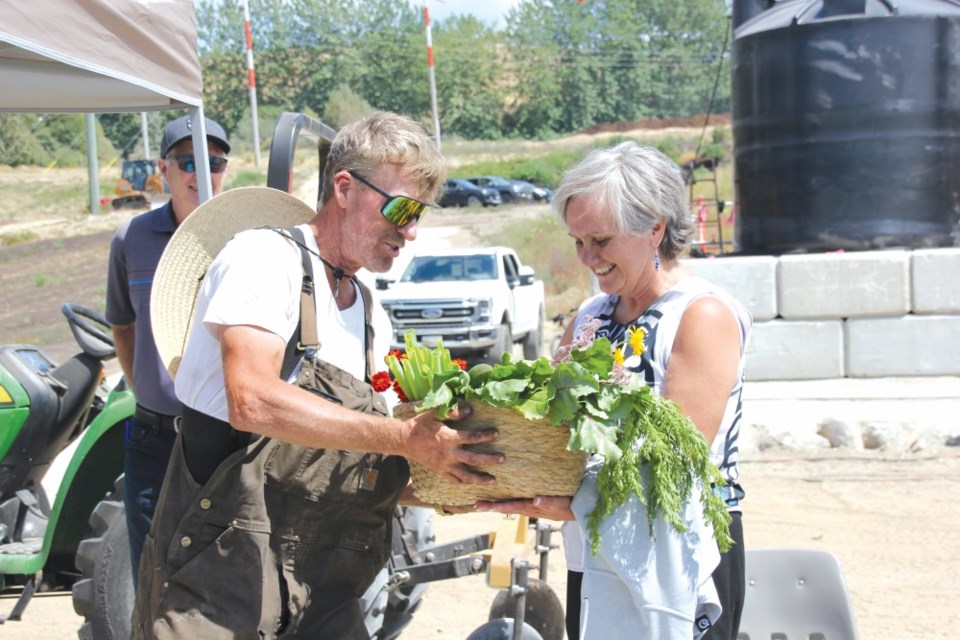Green thumbs have been hard at work since the Salish Sea Regenerative Farm Society announced its plans to convert land next to the Sechelt Hospital into a regenerative farm. Nine months later, the project will soon start providing the hospital with produce for patients.
On July 12, two baskets full of fresh produce were ceremoniously presented to the leader of shíshálh Nation and Sunshine Coast director for Vancouver Coastal Health (VCH) to celebrate the first crop grown at the farm.
Members and elders of shíshálh Nation led a welcome at the opening event with project partners from VCH, the farm society and residents of the nearby Totem Lodge, as well as elected officials. A scavenger hunt invited participants to find the answers to questions such as “What two types of food were most consumed by patients at the hospital last year?” and “How much honey can a single bee produce in their lifetime?” (Answer: Potatoes and lettuce; about a teaspoon's worth.)
VCH’s Sunshine Coast director Marie Duperreault said people come to the hospital because they’re unwell, and spoke of the importance of nutrition.
“The ability… to use produce that is grown right beside the hospital is actually really thrilling,” she said. “The location of the farm is really key, for not only staff, but patients who can come out and just have a walk along the garden as well for mental health.”
Valerie Borne (Joe), an elder of shíshálh Nation, spoke proudly of her son Aaron Joe’s idea for the farm and his contribution to the project. She shared how since he was little, Aaron “has a real vision” for bringing ideas to life.
The land where the farm now grows provided wild berries, she shared, and helped the community survive through the winter. “Every kid had that chore. In fact, you measured your wealth by how much food you had stored in your house, and that meant your kids were loyal, that your children were interested in making sure that the family was fed in our own little way.”
Because the land is on the BC Hydro right-of-way, Borne said they thought it was dead soil. But Aaron had a different idea for the land: using it to create a local sustainable food source while restoring the land.
Aaron Joe of Salish Soils said work on the farm has been incredible. By mid-June, Salish Soils contributed around 400 yards of compost to the project — material that comes from community food waste and green waste, creating a closed-loop system, Joe said. It’s the kind of project he’s wanted to work on since starting his company 13 years ago.
“This is the first year that we’ve grown anything,” Joe said of the demonstration farm, and he welcomes a proactive approach to growing environmental concerns. He’s watched curious people pass by the site and is excited to show them the project that’s taking root.
lhe hiwus yalxwemult (Chief Lenora Joe) of shíshálh Nation said along with water, access to nutritious food is a concern “deep in our hearts.”
“The work that Aaron is doing with his partners is amazing work, and we want to be able to see how we can support that for our community,” yalxwemult said in a previous interview with Coast Reporter. At the event, yalxwemult toured the new farm for the first time and spoke of the potential the space holds.
Another guest of honour in attendance was Magarete Dietz, a resident of the nearby Totem Lodge residential care facility. Known as the “Queen Bee”, the bees now at the farm come from the hive Dietz and her late husband raised years ago. One of the speakers said Dietz was very excited to see her bees in the garden.
Since the farm began, farm coordinator Dave Ryan has started several variations of regenerative agriculture practices and methods to demonstrate different approaches, such as tilling one area but not tilling another. Potatoes, cucumbers and tomatoes have been planted and next season the crops will rotate.
“When you start seeing leaf from the potato, that’s a celebration,” Ryan said.
The main priority, the society’s chair John Talbot said, is providing food to the hospital.
“The exciting thing about it is that all we have to do is walk 30 yards,” Talbot said, to deliver the fresh produce.
Find more about the initiative online at salishsearegenerative.farm.



